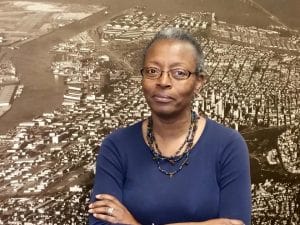As I write this I am a few days away from retiring from the Oakland Public Library where, for the past dozen years, I’ve managed the Oakland History Center. Preparing to leave, I am thinking, naturally, about the work I’ve done here to discover and tell Oakland stories. I remember being intimidated by all the stories I didn’t know. But having grown up in Oakland, I eventually realized that I had witnessed quite a lot of Oakland’s history—redevelopment, white flight to the suburbs, Black Power, financial crises, natural disasters, the Black Arts Movement, affirmative action battles, civil rights marches, and more. Having that lived experience as a foundation helped me connect with and aid researchers in a way that was beneficial to both of us.
Guiding them through the resources here at the Center, they introduced me to areas of inquiry that I hadn’t ever thought about—like, how many barrels of pickles could a person legally own in the 1870s, or how many house moving companies were there in town at the turn of the 20th century. I’ve been inspired by the hundreds of people that I’ve helped discover Oakland’s rich and complicated history. I’m most proud of having helped people discover how we got to where we are now. Those events and journeys have connected us, divided us, and have always presented us with opportunities for future understanding.
Holding history is a big responsibility—that’s what this job has taught me. Whether you’re responsible for an archive or simply preserving family stories for the next generation, history keepers hold the future in their hands. How a family or a community moves into the future has a lot to do with knowing and understanding one's history, the good parts and the bad parts in equal measure. Having access to historical information empowers our community, but we must preserve it and avoid corrupting it in attempts to make it more palatable. Maintaining the Oakland History Center’s collection has been a huge responsibility as it functions as the city’s unofficial archives. The job has made me not only a better librarian but a more aware and compassionate citizen with a deep appreciation for our parks and public transit, our public schools, our tradition of political activism, and for the hundreds of unsung heroes of Oakland.
I’m leaving the Oakland History Center in good hands. My colleague Emily Foster, who some of you have met, will be taking up the reins. With her research and technical skills, the collection and the service that we’ve prided ourselves on will continue to grow. The students, professors, architects, genealogists, real estate agents, developers, filmmakers, novelists, and the visual artists we’ve helped over the years have granted us a unique glimpse into the diversity of Oakland.
In the future look for more digital content on our website. The Oakland History Center will continue to provide history lectures and exhibits, and to work collaboratively with community partners like the Oakland Heritage Alliance. If you’d like to help us illuminate and celebrate the history of our city, consider becoming a member of the Oakland History Center Friends by picking up a brochure in the Oakland History Center in the new year.
As I bid you goodbye, I leave you with a list of some of my favorite Oakland history books.





Add a comment to: The Future of History